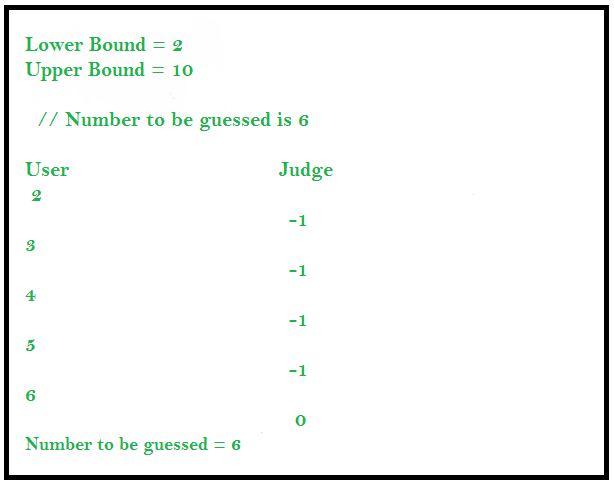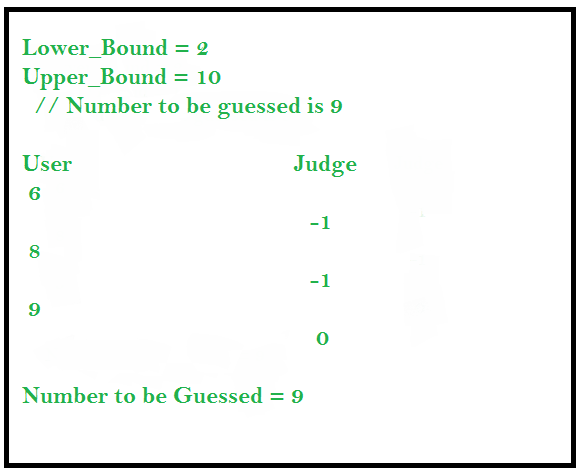Interactive Problems in Competitive Programming
Last Updated :
28 Dec, 2023
Interactive Problems are those problems in which our solution or code interacts with the judge in real time. When we develop a solution for an Interactive Problem then the input data given to our solution may not be predetermined but is built for that problem specifically. The solution performs a series of exchange of data with the judge and at the end of the conversation the judge decides whether our solution was correct or not.
Guessing the Number (An Interactive Problem)
In this problem the user has to guess the number during a communication with the judge. The user is provided with the upper and lower bound and he/she can ask the judge whether a number is the number to be guessed. The judge replies with -1 if the number is smaller than the number to be guessed or 1 if number is greater than the number to be guessed or 0 if it is equal to the number to be guessed.
Approach 1 : Linear Guessing
The user can query the judge for all the numbers between lower limit and upper limit to find the solution.

C++
#include <bits/stdc++.h>
using namespace std;
int main()
{
int lower_bound = 2;
int upper_bound = 10;
for (int i = lower_bound; i <= upper_bound; i++) {
cout << i << endl;
int response;
cin >> response;
if (response == 0) {
cout << "Number guessed is :" << i;
break;
}
}
return 0;
}
|
Java
import java.util.*;
class GFG {
public static void main(String[] args)
{
Scanner sc1 = new Scanner(System.in);
int lower_bound = 2;
int upper_bound = 10;
for (int i = lower_bound; i <= upper_bound; i++) {
System.out.println(i);
int response = sc1.nextInt();
if (response == 0) {
System.out.println("Number guessed is :" + i);
break;
}
}
}
}
|
Python3
if __name__=='__main__':
lower_bound = 2;
upper_bound = 10;
for i in range(lower_bound, upper_bound + 1):
print(i)
response = int(input())
if (response == 0):
print("Number guessed is :", i, end = '')
break;
|
C#
using System;
class GFG
{
public static void Main(string[] args)
{
int lower_bound = 2;
int upper_bound = 10;
for (int i = lower_bound; i <= upper_bound; i++)
{
Console.WriteLine(i);
int response = int.Parse(Console.ReadLine());
if (response == 0) {
Console.WriteLine("Number guessed is :" + i);
break;
}
}
}
}
|
Javascript
let lowerBound = 2;
let upperBound = 10;
for (let i = lowerBound; i <= upperBound; i++) {
console.log(i);
let response = prompt("Enter 0 if the number is guessed correctly:");
response = parseInt(response);
if (response === 0) {
console.log("Number guessed is: " + i);
break;
}
}
|
Output
2
Number guessed is :2
Time Complexity: O(n)
Approach 2 : Applying Binary Search
We can also apply binary search interactively to find the solution. This solution is efficient as compared to the previous approach.

C++
#include <bits/stdc++.h>
using namespace std;
int main(int argc, char** argv)
{
int lower_bound = 2;
int upper_bound = 10;
while (lower_bound <= upper_bound)
{
int mid = (lower_bound + upper_bound) / 2;
cout << mid << endl;
int response;
cin >> response;
if (response == -1)
lower_bound = mid + 1;
else if (response == 1)
upper_bound = mid - 1;
else if (response == 0){
cout << "Number guessed is :" + to_string(mid) << endl;
break;
}
}
return 0;
}
|
Java
import java.util.*;
class GFG {
public static void main(String[] args)
{
Scanner sc1 = new Scanner(System.in);
int lower_bound = 2;
int upper_bound = 10;
while (lower_bound <= upper_bound) {
int mid = (lower_bound + upper_bound) / 2;
System.out.println(mid);
int response = sc1.nextInt();
if (response == -1) {
lower_bound = mid + 1;
}
else if (response == 1) {
upper_bound = mid - 1;
}
else if (response == 0) {
System.out.println("Number guessed is :" + mid);
break;
}
}
}
}
|
Python3
lower_bound = 2
upper_bound = 10
while (lower_bound <= upper_bound) :
mid = (lower_bound + upper_bound) // 2
print(mid)
response = int(input())
if (response == -1) :
lower_bound = mid + 1
elif (response == 1) :
upper_bound = mid - 1
elif (response == 0) :
print("Number guessed is :", mid)
break
|
C#
using System;
class GFG {
static void Main() {
int lower_bound = 2;
int upper_bound = 10;
while (lower_bound <= upper_bound) {
int mid = (lower_bound + upper_bound) / 2;
Console.WriteLine(mid);
int response = Convert.ToInt32(Console.ReadLine());
if (response == -1) {
lower_bound = mid + 1;
}
else if (response == 1) {
upper_bound = mid - 1;
}
else if (response == 0) {
Console.WriteLine("Number guessed is :" + mid);
break;
}
}
}
}
|
Javascript
const readline = require('readline');
const rl = readline.createInterface({
input: process.stdin,
output: process.stdout
});
function binarySearch() {
let lowerBound = 2;
let upperBound = 10;
while (lowerBound <= upperBound) {
let mid = Math.floor((lowerBound + upperBound) / 2);
console.log(mid);
rl.question('Enter -1 if the number is lower, 1 if higher, or 0 if guessed correctly: ', (response) => {
response = parseInt(response);
if (response === -1) {
lowerBound = mid + 1;
} else if (response === 1) {
upperBound = mid - 1;
} else if (response === 0) {
console.log("Number guessed is: " + mid);
rl.close();
return;
}
binarySearch();
});
return;
}
}
binarySearch();
|
Output
6
Number guessed is :6
Time Complexity: O(logn)
Algorithm Paradigm: Divide and Conquer
Share your thoughts in the comments
Please Login to comment...